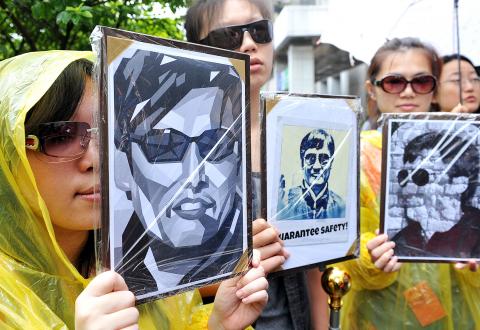|
Activists rally for
Chinese dissident
BACKING CHEN: The protesters gathered outside
the American Institute in Taiwan in Taipei, urging the US to guarantee the
safety of Chen Guangcheng and his family
By Loa Iok-sin / Staff reporter

Members of Amnesty International
Taiwan and other human rights organizations hold up signs to show their support
for Chinese legal activist Chen Guangcheng outside the American Institute in
Taiwan in Taipei yesterday.
Photo: Chien Jung-fong, Taipei Times
More than a dozen human rights activists
rallied outside the American Institute in Taiwan (AIT) in Taipei yesterday,
hoping to deliver a petition to urge the US government to guarantee Chinese
dissident Chen Guangcheng’s (陳光誠) safety and provide assistance to him, his
supporters and family.
Standing in the pouring rain, more than a dozen human rights advocates held
portraits of Chen, as well as placards that read: “Guarantee Chen’s Safety” and
“Everyone is Chen Guangcheng.” They also chanted slogans urging the US to offer
Chen assistance.
However, because the AIT office is designated by the Ministry of Foreign Affairs
as a restricted area for assemblies, the activists were surrounded by police
officers, while dozens more officers formed a human wall in front of the AIT
building.
“We’re here to call on the US government to guarantee the safety of Chen, his
family and his supporters,” said Amnesty International Taiwan chairman Freddy
Lim (林昶佐), who is also the lead vocalist of the metal band Chthonic. “Currently,
the US and China are holding talks on economic and strategic cooperation. We
want to remind them that national interests should not be protected at the
expense of human rights.”
Chen, a well-known dissident, who angered authorities in rural China by exposing
forced abortions, escaped from house arrest last month and went to the US
embassy in Beijing. Earlier this week, he left the embassy for a checkup at a
hospital, but then told friends that he felt threatened and wanted to leave
China.
“I have the same background as Chen — I am also a lawyer and I am also visually
impaired — so I think I understand his feelings better,” attorney Lee Ping-hung
(李秉宏) said. “I hope the US and China handle Chen’s case well, to set a good
example for similar incidents to come.”
Taiwan Association for Human Rights chairman Lai Chung-chiang (賴中強) called on
the US to remember the founding principles of the country.
“The US should respect Chen’s will and help him — the right to pursue freedom
and happiness is the founding principle of the United States,” he said.
He also called on President Ma Ying-jeou (馬英九) to address human rights
conditions in China and said that the government should postpone the eighth
round of talks between the Straits Exchange Foundation and the Association for
Relations Across the Taiwan Straits until Chen is free.
After the brief rally was over, police officers told the group that three
representatives would be allowed into the AIT office to deliver their petition.
However, when the three were on the steps of the AIT office, the police asked
them to tell the remaining people to leave.
The representatives said that they had already declared the protest over and
they had no power to ask individuals to go who chose to stay of their own free
will.
The officers then refused to allow a meeting between the representatives and AIT
officials, and the groups later decided to send the petition to the AIT by mail.
In a departure from routine practice, no AIT official came out to meet with the
protesters.
In response to an inquiry from the Taipei Times, AIT spokesperson Christopher
Kavanagh said he had intended to go out and receive the petition as he has done
in the past. However, Kavanagh said the protesters were told that an official
would come out to receive the petition if the protesters moved slightly to allow
the public to access the AIT building, because they were blocking public access
to the consular entrance. The protesters then told the AIT they would mail the
petition, Kavanagh said.
Kavanagh did not respond to the three-point petition because he had yet to see
it.
|
![]()
![]()
![]()